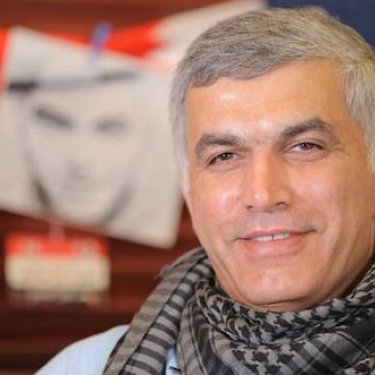Nabeel Rajab released but condemned to silence

Reporters Without Borders (RSF) is relieved by yesterday’s release of Nabeel Rajab, a blogger and human rights defender who was one of Bahrain’s most emblematic prisoners of conscience, but points out that his freedom is incomplete because he is still denied his right to free speech. RSF also calls for the immediate release of the 11 other journalists held in Bahrain.
The head of the Bahrain Centre for Human Rights, Nabeel Rajab was freed as a result of a court decision to adjust the form of his sentence just four days ahead of the fourth anniversary of his arrest on 13 June 2016.
But he continues to be convicted on the charges on which he was sentenced in February 2018 to five years in prison and he will not be free to express his opinions on human rights issues until the remaining three years of that sentence have expired.
After his arrest in 2016, Rajab was charged with spreading false information and “malicious rumours undermining the prestige of the state” because he had tweeted criticism of the Saudi-backed military intervention in Yemen and had written an open letter for the New York Times in September 2016 and for Le Monde in December 2016 condemning torture in Bahrain’s prisons.
“Nabeel Rajab’s release is a relief, but it has been conditioned on his silence, which shows the authorities are reluctant to allow any real freedom to inform,” said Sabrina Bennoui, the head of RSF’s Middle East desk. “Eleven journalists are still detained in Bahrain, which makes it one of the Middle East’s biggest jailers of journalists relative to population size. The authorities must end these unjustified detentions.”
Rajab’s release has been widely hailed by civil society groups although the overall situation is still worrying. Husain Abdulla, who heads Americans for Democracy and Human Rights in Bahrain (ADHRB), said the pressure needs to be maintained on the Bahraini authorities until they release “journalists and leading bloggers like Mahmood Al-Jazeeri and Dr. Abduljalil Alsingace and all the other prisoners who have been incarcerated solely for expressing their opinion.”
In Bahrain, prison sentences must be served consecutively. Hassan Mohamed Qambar, a journalist already sentenced to more than 100 years in prison, was given an additional life sentence last December. For covering protests in 2011, he was convicted of “supporting a terrorist cell” by “filming their activities, posting the videos on social media and sending them to the media.”
Mahmood Al-Jazeeri, a journalist who was sentenced to 15 years in prison in 2017, was placed in solitary confinement in April because he issued a statement from his cell denying the government’s claims that measures had been taken to combat the spread of Covid-19 in Bahrain’s prisons.
Bahrain is ranked 169th out of 180 countries and territories in RSF's 2020 World Press Freedom Index.



